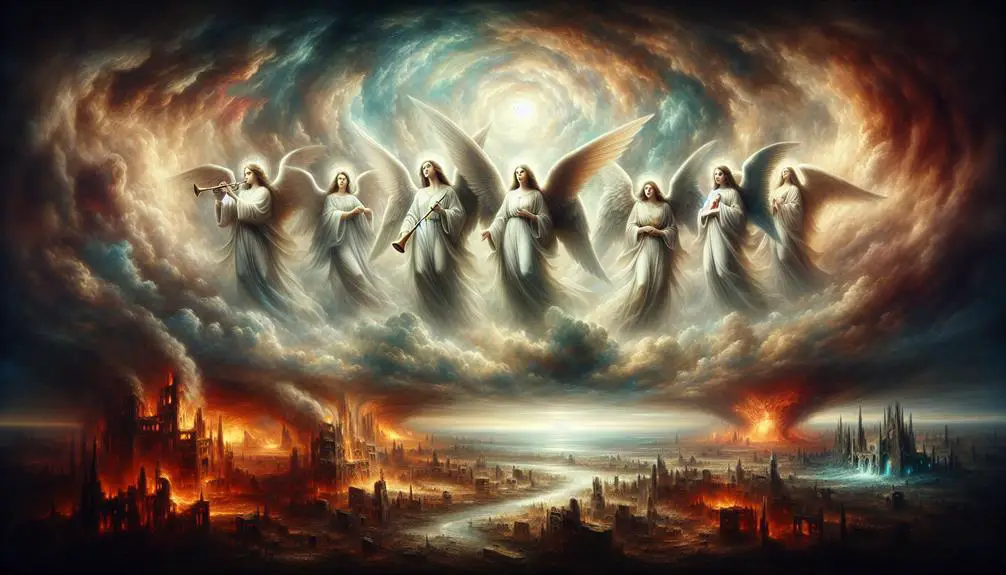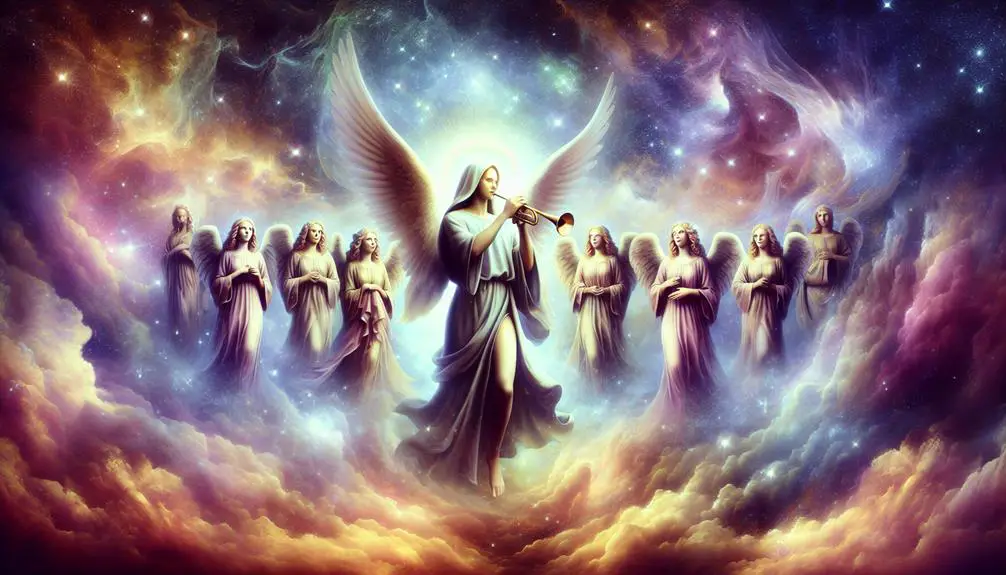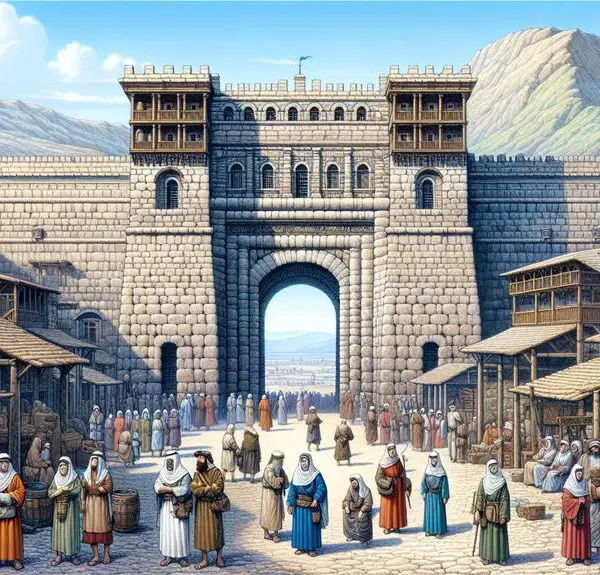The sixth angel in the Bible heralds apocalyptic events, inviting readers to explore the depths of prophecy and divine judgment.

Who Is the Sixth Angel in the Bible
Just as Dante navigated the realms of the afterlife with celestial guidance, you too might find yourself intrigued by the enigmatic figures orchestrating events from the heavens in the Bible.
The sixth angel, in particular, holds a pivotal role within the apocalyptic narrative of Revelation, sounding a trumpet that heralds profound cosmic disturbances.
Unraveling the identity and significance of this celestial being isn't just a matter of theological curiosity but could shine a light on broader themes of judgment and redemption that resonate throughout the scripture.
To fully grasp the impact of this angel's actions, one must look beyond the surface, into a realm where symbolism and prophecy intertwine.
Key Takeaways
- The sixth angel is tasked with pouring out the sixth vial of God's wrath, symbolizing divine punishment and cleansing.
- This angel plays a pivotal role in preparing the world for final judgment, marking a significant turning point in Revelation.
- Part of a structured angelic hierarchy, the sixth angel's actions underscore the orderliness and severity of divine wrath.
- The symbolism surrounding the sixth angel communicates themes of divine justice, mercy, and the impending final judgment.
The Role of Angels in Revelation

In the Book of Revelation, angels play a pivotal role in unfolding the apocalyptic events, serving as messengers and executors of God's divine judgment. This complex narrative structure highlights an angelic hierarchy, emphasizing their importance as divine messengers. Each angel, assigned specific duties, operates within this framework, showcasing a meticulously organized celestial order.
You'll find that the angelic hierarchy isn't just about rank; it's a reflection of the diverse roles these beings play in the divine plan. Angels aren't merely background characters; they're central to the progression of Revelation's storyline. Their actions—ranging from blowing trumpets that herald catastrophes to pouring out bowls of wrath—underscore their significance in orchestrating events that lead to the end times.
Diving deeper, this celestial order underscores the notion of divine messengers being entrusted with grave responsibilities. These angels don't act on whim but are guided by divine will, each playing a part in the fulfillment of prophetic visions. Their roles are so critical that without their intervention, the narrative of Revelation would lose its momentum and purpose.
Analyzing their contributions, you realize that the angelic hierarchy isn't just a testament to the structured nature of the divine realm but also a mechanism through which Revelation communicates its themes. Through their actions, these divine messengers bring to life the warnings, judgments, and promises contained in the text, making the abstract concrete and the prophetic palpably real.
Understanding their roles within this hierarchy enhances your appreciation for the narrative's complexity and the meticulous planning behind the apocalyptic events described. It's a reminder that in the cosmic scheme, every detail and every actor has its place and purpose.
Identifying the Sixth Angel

You must recognize the significance of the sixth angel's role within the biblical narrative, particularly in the Book of Revelation. This entity's presence marks a pivotal point in the sequential unveiling of angelic actions, shaping the course of events detailed in these scriptures.
Understanding the sixth angel's specific duties and the context of their appearance provides a deeper insight into the overarching themes and messages of Revelation.
Sixth Angel's Biblical Role
Exploring the role of the sixth angel in the Bible reveals a pivotal figure in the unfolding of apocalyptic events, as described in the Book of Revelation. This angel, part of the angelic hierarchy, serves as one of the divine messengers tasked with executing God's judgment. Their actions are not only significant but are central to the narrative's progression toward the culmination of the divine plan.
Aspect |
Description |
|---|---|
Identity |
Sixth of the seven angels |
Task |
Pour out the sixth vial of God's wrath |
Symbolism |
Divine punishment and cleansing |
Impact |
Prepares the world for final judgment |
Narrative Role |
Catalyst for the final events in the Book of Revelation |
This angel's role is critical, marking a turning point in the biblical apocalypse narrative.
Revelations' Sequential Angelic Presence
To understand the sequential angelic presence in Revelation, it's crucial to identify the sixth angel as a key figure executing divine judgment through the pouring of the sixth vial. This act is part of a broader narrative of divine interventions, orchestrated within a meticulously defined angelic hierarchy. Here's why the sixth angel's role is pivotal:
- Introduces Unprecedented Calamities: The sixth angel unleashes events that are unparalleled in their scope and severity, serving as divine retribution.
- Marks a Turning Point: This moment signifies a critical juncture in Revelation, transitioning from warnings to the tangible onset of judgment.
- Emphasizes the Orderliness of Divine Wrath: The sequential release of judgments underscores a methodical and hierarchical approach to divine intervention, highlighting the structured nature of the angelic realm and its operations.
The Sixth Angel's Trumpet

Upon blowing the sixth trumpet, a voice is heard from the four horns of the golden altar before God, signaling a pivotal moment in biblical prophecy. This moment marks the commencement of a series of apocalyptic events, underlining the gravity of the situations unfolding as described in the Book of Revelation. When the trumpet sounds, it heralds a period of unprecedented turmoil and serves as a clear indicator that the narrative is entering a new, more intense phase of prophetic fulfillment.
The significance of the trumpet's blast can't be overstated. It's not merely a signal; it's a catalyst for change, ushering in actions that have been predetermined in the divine scheme. The sounding of the trumpet sets off events that are both catastrophic and transformative, emphasizing the power and authority vested in the angel responsible for this act.
Specifically, the sixth trumpet's sound leads to the release of four angels who are bound at the great river Euphrates. These angels, prepared for this very hour, day, month, and year, are given the power to kill a third of mankind. The imagery is vivid and the implications are dire, showcasing a pivotal moment in the unfolding of end-time scenarios. The description of a vast army and the ensuing destruction paints a picture of divine judgment that's both precise and harrowing.
The apocalyptic events triggered by this trumpet serve as a stark reminder of the consequences of divine wrath and the inexorable fulfillment of prophecy. The narrative isn't just about destruction; it's a testament to the seriousness with which divine mandates are to be taken and the inevitable reality of judgment.
Symbolism and Interpretation

Delving into the symbolism behind the sixth trumpet reveals layers of meaning that resonate deeply with both ancient and contemporary interpretations. The imagery and actions associated with this angel offer a rich tapestry of spiritual and prophetic messages, which can be challenging to unpack. Here are three critical aspects to consider:
- The Role of Angel Metaphors:
Angel metaphors in biblical prophecy often signify divine intervention or messages. In the case of the sixth angel, the metaphor extends to judgment and the unleashing of consequences upon the earth. This symbolism is potent, suggesting a divine reckoning that's both inevitable and transformative.
- Symbolic Numbers and Events:
The specifics surrounding the sixth trumpet—such as the number of horsemen, the description of plagues, and the reference to a third of mankind—carry deep symbolic weight. These elements aren't random but are carefully chosen to communicate specific aspects of divine justice and mercy, as well as the severity of human sinfulness.
- Interpretive Challenges:
The vivid imagery and complex symbolism associated with the sixth angel present significant interpretive challenges. Scholars and theologians have debated the meanings behind these passages for centuries, often arriving at different conclusions. The interpretive process requires a balance of historical understanding, theological insight, and spiritual discernment, making the sixth angel one of the most intriguing and debated figures in biblical prophecy.
Understanding the symbolism and interpretation of the sixth angel's trumpet requires a deep dive into both angel metaphors and the broader context of biblical prophecy. These elements combine to offer a multifaceted view of divine communication that continues to challenge and inspire.
Historical and Theological Context

Exploring the historical and theological context enriches our understanding of the sixth angel's symbolism, revealing the depth of its roots in biblical prophecy and religious thought. When you delve into the scripture, it becomes clear that the angel hierarchy plays a critical role in the unfolding of divine plans and messages. The sixth angel, as part of this celestial order, is no exception. Its mention isn't merely for narrative flair but serves as a cornerstone in the grand tapestry of divine messaging.
You'll find that angelic figures, including the sixth angel, are far more than mere messengers or supernatural beings; they're embodiments of divine will, each with a role intricately woven into the fabric of biblical prophecy. The concept of angel hierarchy, where angels are organized in a celestial order, underscores the structured nature of divine intervention in human affairs. This structure isn't arbitrary but reflects a complex understanding of authority and duty within the spiritual realm.
The sixth angel, like its counterparts, is a divine messenger, tasked with specific duties that contribute to the larger narrative of salvation and judgment. This role is deeply entrenched in the theological framework that guides interpretations of biblical events and prophecies. Understanding this angel's place within the hierarchy not only sheds light on its particular function but also on the broader workings of divine communication and intervention.
In essence, the historical and theological context of the sixth angel reveals a multifaceted depiction of divine messaging, marked by a strict hierarchical order and a deep sense of purpose. This angel's role is emblematic of the structured, purpose-driven nature of divine intervention in the biblical narrative.
Impact on Eschatology

You'll find that eschatological interpretations of the Sixth Angel vary widely, reflecting diverse theological perspectives and historical contexts. These interpretations often tie into prophecies and modern beliefs, influencing how scholars and believers alike view the end times.
Moreover, the symbolism associated with the Sixth Angel in Revelation provides rich material for analyzing its role and significance in eschatological discourse.
Eschatological Interpretations Varied
How do interpretations of the Sixth Angel's role in biblical prophecy vary, and what impact do these variations have on eschatological studies? Understanding these differences is crucial for several reasons:
- Cultural Influences: Different cultures interpret apocalyptic literature uniquely, leading to diverse understandings of end times.
- Theological Perspectives: Various denominations and theological schools emphasize different aspects of the Sixth Angel's role, influencing broader eschatological frameworks.
- Scholarly Debates: Interpretations fuel academic discussions, pushing the boundaries of biblical eschatology and its implications for modern faith communities.
These variances in interpretation not only enrich our understanding of apocalyptic literature but also highlight the dynamic nature of biblical exegesis. As you delve into the complexities of eschatological studies, it's essential to consider these multifaceted interpretations and their profound impact on the field.
Prophecies and Modern Beliefs
Modern prophecies often intertwine with existing beliefs, significantly shaping contemporary eschatological perspectives. Modern interpretations of the sixth angel in the Bible delve into the intricate angelic hierarchy, providing a profound impact on how end-times events are perceived. This angelic figure, as part of the broader eschatological narrative, reflects a pivotal role in the unfolding of divine judgment, according to modern beliefs.
Aspect |
Impact on Eschatology |
|---|---|
Angelic Hierarchy |
Refines understanding of divine order |
Sixth Angel |
Signifies critical end-times events |
Modern Prophecies |
Aligns with contemporary beliefs |
Interpretations |
Influences individual and collective eschatology |
These elements underscore the significance of the sixth angel's role in eschatology, emphasizing a detailed, analytical approach to understanding end-times prophecies and their implications for modern believers.
Symbolism in Revelation
In analyzing the Book of Revelation, it's evident that symbolism plays a crucial role in shaping our understanding of eschatology, particularly through its vivid depiction of apocalyptic events and figures. This intricate use of symbols not only captures the imagination but also communicates deep theological truths about the end times. Here are three ways symbolism impacts eschatology:
- Apocalyptic Imagery: The vivid symbols, from beasts to battles, create a rich tapestry that scholars and theologians interpret in various ways, influencing eschatological views across different Christian denominations.
- Divine Judgments: Symbols representing divine judgments, such as the seven seals, trumpet blasts, and bowls of wrath, underscore the seriousness of God's final actions against evil.
- Eternal Promises: Symbolic descriptions of the New Jerusalem and the Tree of Life offer believers hope and assurance of God's eternal promises, anchoring eschatological hope in tangible visions of a renewed creation.
Frequently Asked Questions
How Has the Depiction of the Sixth Angel Evolved in Different Artistic Representations Throughout History?
You've noticed the depiction of the sixth angel has transformed significantly through history. Initially rooted in traditional angel iconography, artists emphasized divine wrath and judgment.
Over time, modern interpretations have shifted focus. Now, they often highlight themes of redemption or environmental warnings, reflecting contemporary concerns.
This evolution in artistic portrayal showcases a deepening complexity in understanding, moving from strictly biblical representations to more nuanced, symbolic interpretations that resonate with today's audiences.
Are There Any Major Religious Denominations That Have a Unique Perspective or Doctrine Specifically About the Sixth Angel Not Commonly Shared by Others?
You're diving into a sea of spiritual inquiry, where angel hierarchy and denominational differences ripple beneath the surface.
In this exploration, you'll find that while many religious groups share common beliefs about angels, certain denominations hold unique views about the sixth angel, setting them apart.
These perspectives are rarely echoed outside their circles, reflecting deep-rooted theological interpretations.
Analyzing these distinctions offers a window into the diverse fabric of faith and doctrine.
What Are Some Notable Literary Works or Fictional Stories That Have Been Inspired by or Incorporate the Sixth Angel as a Character or Theme?
You'll find that angel literature often dives deep into fictional symbolism, using figures like the sixth angel to weave intricate narratives. Works such as 'Good Omens' by Neil Gaiman and Terry Pratchett or 'The Book of Revelation' inspired pieces highlight how these celestial beings are more than mere characters; they embody complex themes of morality, judgement, and redemption.
These stories not only entertain but also invite readers to ponder profound spiritual and existential questions.
How Do Various Non-Christian Religions or Belief Systems Interpret or Acknowledge the Concept of the Sixth Angel, if at All?
You'll find that various non-Christian beliefs don't specifically recognize the sixth angel but have their own interpretations of angelic figures. These interpretations often tie into broader themes of religious symbolism, reflecting values, moral lessons, or cosmological concepts unique to each belief system.
While the exact role or identity of a 'sixth angel' mightn't translate directly, the concept of divine messengers transcends many religious boundaries, enriching the tapestry of global spirituality.
Can Parallels Be Drawn Between the Sixth Angel in the Bible and Figures or Symbols in Other Ancient Mythologies or Religious Texts Outside of Christianity?
Absolutely, you can draw cosmic parallels between figures in ancient mythologies and the concept in question. Delving deep into mythological symbolism, you'll find that various cultures have entities resembling this enigmatic character, each embodying divine messages or cataclysmic change.
Analyzing these connections offers a rich tapestry of understanding, showcasing how different religions and mythologies weave similar narratives of celestial messengers or harbingers, echoing universal themes across human belief systems.
Conclusion
In the tapestry of Revelation, the sixth angel stands as a harbinger of transformation, wielding a trumpet that unravels the fabric of reality. Through this celestial figure, you're invited to ponder the depths of human existence and the inevitable cycles of destruction and rebirth.
This angel's trumpet doesn't just signal calamity; it echoes the profound interconnectedness of all things, urging you to reflect on the infinite complexity of the divine plan. In essence, the sixth angel embodies the paradox of devastation as a pathway to renewal, challenging you to find meaning amid chaos.



Sign up